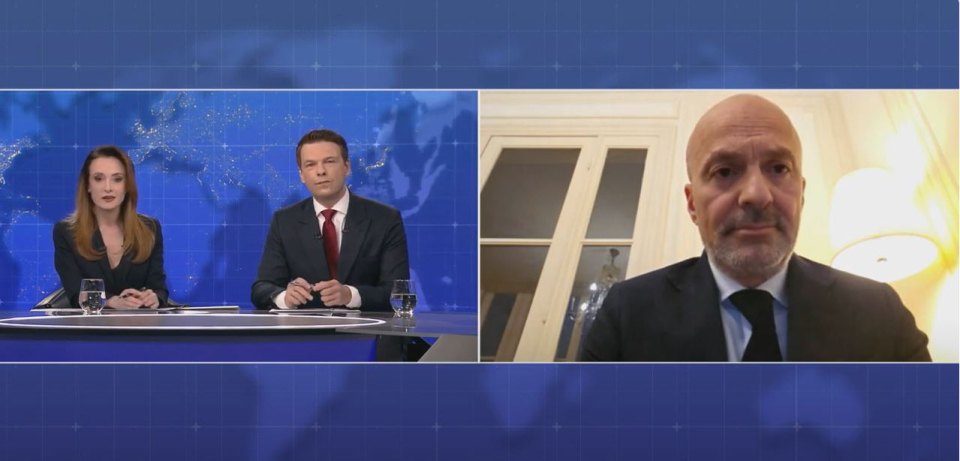Analysis
Europe's Mideast Muddle
By Daniel Schwammenthal
The Wall Street Journal Europe
Palestinian leader Mahmoud Abbas's effort to seek United Nations recognition for a unilaterally declared state would far more likely end the peace process than the conflict. But don't count out the chance that European nations might support the idea even if it's not in their best interests, nor in the interest of Israeli-Palestinian reconciliation.
Last Wednesday during a visit to Israel, European Parliament President Jerzy Buzek explained that "I never said that I or the European Union opposes a unilateral declaration," only that "it is better to negotiate the solution." Particularly French President Nicolas Sarkozy has expressed similar sentiments, telling French weekly L'Express last month that "if the peace process is still dead in September, France will face up to its responsibilities on the central question of recognition of a Palestinian state." European leaders might back a unilateral Palestinian move because they are "frustrated" with the stalled Middle East peace process, diplomats explain.
But frustration is rarely good counsel. And Europe's particular frustration in this case—directed mainly at Israel—ignores that the Palestinians have refused direct talks for more than two years, after they rejected three Israeli peace offers in the previous decade. A U.N. General Assembly vote recognizing a Palestinian state, particularly one backed by Western democracies, might give the Palestinians a quick propaganda victory, but not an independent state.
Israel isn't going to simply pack up and accept a one-sided imposition of borders or principles that ignore the country's legitimate security concerns. The Palestinians will gain real sovereignty only through peace talks with Israel where both sides will have to make painful compromises. And that is the fatal flaw inherent in the U.N. vote: Any parameters and borders endorsed in September, however vague, would automatically become non-negotiable positions for the Palestinians. No Palestinian Authority leader could ever afford to be "less Palestinian" than the U.N. So if some EU members insist on backing a U.N. vote, they'll only help make a temporary stalemate permanent.
This is why the insistence on a negotiated settlement and the rejection of unilateral moves were enshrined in the 1993 Oslo Accords and endorsed by the Middle East Quartet—of which the EU is a member—and repeated in numerous EU Council conclusions. Apart from being counterproductive, endorsing the Palestinians' unilateral move means endorsing the violation of past agreements.
But isn't the EU still a community of law? Any such violation of past agreements could easily turn bloody. Palestinians who are led to believe that a U.N. vote will bring about immediate independence will be terribly disappointed in September. Similar instances of disappointment in the past have often reignited violence, and not only in the region itself.
Over the past several years, trouble in the Middle East has routinely fueled attacks on Jewish communities in Europe. EU leaders need to be careful not to inadvertently fan the flames of a conflict that might play itself out in their own streets. The recent Fatah-Hamas deal to form a Palestinian unity government has made such violence more likely and U.N. recognition therefore even more problematic.
A Palestinian government comprised of or backed by an unreformed Hamas would allow Gaza's Islamists to expand their control to the West Bank. Hamas, which is on the EU terror list, refuses to accept the principles established by the international community: to recognize Israel, cease all violence and adhere to past agreements. Tactical moves by Hamas, such as hiding behind a temporary government of technocrats or refraining from terror attacks until the September vote, should not fool any European leader. One of the lessons Western nations supposedly learned from the recent popular uprisings in North Africa and the Middle East is that turning a blind eye to human-rights violations in the interest of "stability" is no longer an option.
Hamas's raison d'être is to violate the human rights of Palestinians and Israelis alike by, for instance, attacking Israeli civilians while using its own as human shields. Hamas also terrorizes its own population by persecuting Palestinian Christians, homosexuals and political opponents, and suppresses the rights of Palestinian women in Gaza. By recognizing a unilateral declaration of statehood, Europeans would divorce the creation of a Palestinian state from the ultimate goal of peace. And by accepting a Hamas-backed government, they would divorce the creation of that state from the humanitarian hopes expressed throughout the Arab Spring.
Europe doesn't have to go down this path. The EU and its member states would only need to join the United States in opposing the planned U.N. vote in September. Mr. Abbas could then convincingly argue that he can't go against the wishes of the Palestinians' largest donors, and thus will be able to drop his plans without losing his people's respect.
Mr. Schwammenthal is the director of the AJC Transatlantic Institute, based in Brussels.









